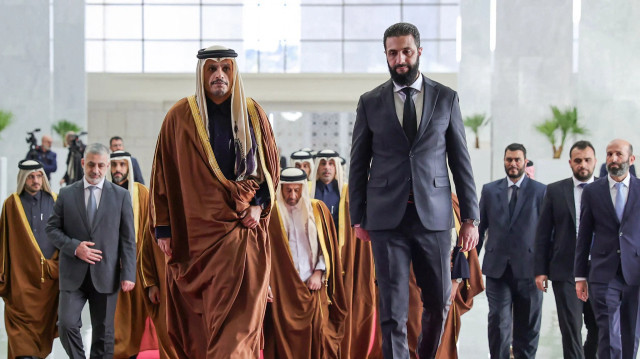
Sheikh Mohammed bin Abdulrahman Al Thani holds joint press conference with head of Syria's new administration Ahmed al-Sharaa in Damascus
Qatar's Prime Minister Sheikh Mohammed bin Abdulrahman Al Thani called on Israel to “immediately withdraw” its forces from the buffer zone with Syria, as he arrived in Damascus on Thursday, marking his first visit to the country since last month's fall of the Bashar al-Assad regime.
Upon arrival, Sheikh Mohammed held talks with Ahmed al-Sharaa, the leader of Syria's new administration.
“We are ready to cooperate with Syria's new administration on various fronts, including lifting sanctions,” he told a joint press conference with al-Sharaa.
The Qatari premier condemned Israel's seizure of the buffer zone in the occupied Syrian Golan Heights. "The Israeli seizure of the buffer zone with Syria is condemned and it must withdraw immediately," he said.
Last month, the Israeli military occupied the buffer zone in the Golan Heights and expanded its hold on the territory, most of which it has occupied during the 1967 Middle East War.
Sheikh Mohammed underscored the importance of international cooperation to address humanitarian needs and called for lifting sanctions on Syria to bolster aid efforts.
The prime minister announced Qatar's commitment to providing technical support to rehabilitate infrastructure in Syria, particularly the electricity sector, with an initial 200-megawatt power supply for over 10 Syrian regions, with plans for gradual expansion.
He confirmed that Qatari Emir Tamim bin Hamad Al Thani had received an invitation to visit Syria, with the trip anticipated “in the near future.”
He said he also discussed potential economic and investment projects between Qatar and Syria, signaling a new phase of bilateral relations.
Al-Sharaa, for his part, commended Qatar for supporting the Syrian people during their struggle against the Assad regime.
Commenting on Israel's recent movements in the buffer zone, al-Sharaa attributed the actions to alleged threats from Iranian militias and Hezbollah, though he asserted their presence had ended.
“Syria remains committed to the 1974 Disengagement Agreement and is ready to welcome UN forces to restore conditions to their prior state,” he added.
Al-Sharaa acknowledged Qatar's significant role in rallying international opposition to Israel's advances and anticipated Doha's active involvement in exerting pressure on the issue alongside Western and regional partners.
On Wednesday, Israel announced the seizure of over 3,300 Syrian military assets, including tanks, anti-tank missiles, and mortars, though it did not disclose the locations or dates of the operation.
Qatari Foreign Ministry spokesperson Majid Al-Ansari said early Thursday that the prime minister's visit confirms Qatar's commitment to supporting Syria during its transitional period.
The visit follows Qatar's reopening of its embassy in Damascus in late December, ending a closure that had lasted since 2011 following the Assad regime's brutal crackdown on pro-democracy protests.
Earlier this month, Doha hosted Syrian Foreign Minister Asaad Al-Shaibani, further emphasizing Qatar's role in fostering diplomatic ties with post-Assad Syria.
Assad, Syria's leader for nearly 25 years, fled to Russia after anti-regime groups took control of Damascus on Dec. 8, ending the Baath Party's regime, which had been in power since 1963.

